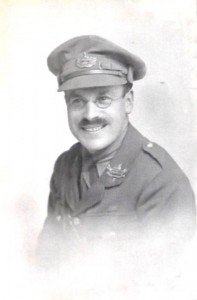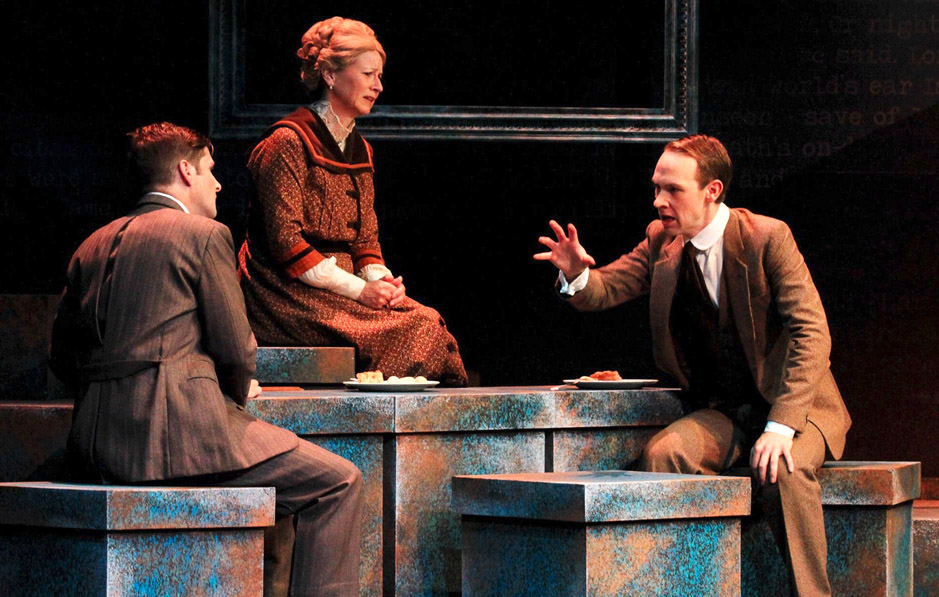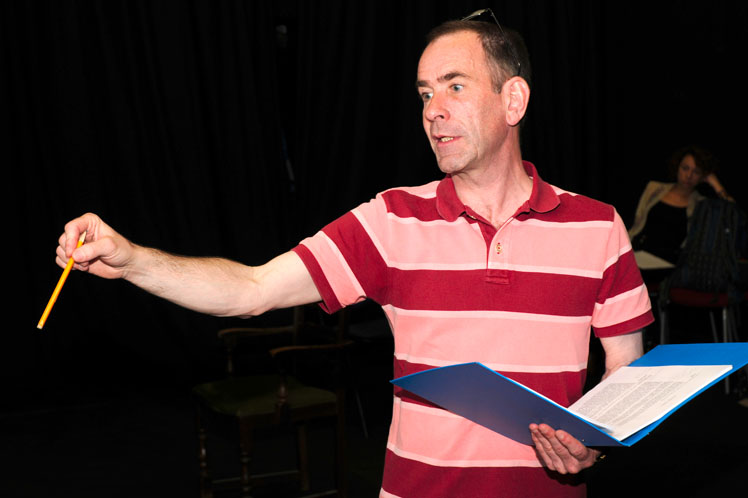It is only right and proper that the Everyman Theatre, one of the main focal points of culture in Cheltenham, should take it upon itself to commemorate the 100th anniversary of the outbreak of First World War – especially since the Borough Council’s thoughtless and lamentable decision to barricade for restoration work the local War Memorial in the Promenade a week before the centenary.
No town or village in the country was left unaffected by the war to end all wars so it is fitting that the Everyman’s production has found the work of an almost forgotten local writer to use as its vehicle. It is also fitting that members of the local community should be involved.
Will Harvey’s War is an adaptation by the Everyman’s creative director Paul Milton, of Will Harvey, a biographical novel by F.W. Harvey who was born and brought up in the Forest of Dean. The production Paul has put together is no mean achievement, involving, as it does, over sixty performers of which only four are professional. It can be difficult mixing professional and amateur actors but Paul has managed an almost seamless integration where the joins hardly show.
The play starts with Will as a young boy, nicely played by Benjamin Crossley, growing up in rural Gloucestershire and his early attempts at writing poetry. It then takes us through his career as a solicitor in a dull northern town and his going off to war with his brother Eric. However, Will Harvey’s War is mainly a love story exploring Will’s strange relationship with a gypsy girl (played by Amanda Gordon) he first meets near his home who then, disguised as a man, joins the army and follows him to the front.
Music and movement play an integral part in the production. The choice of the music, ranging from Gustav Holst (of course) to Franz Lehar, is spot-on and is majestically and enthusiastically played by the Cheltenham Silver Band. The choir, directed by Caroline Mander, was excellent and there were a couple of songs in the second half that were truly beautiful.
Of the movement/choreography I was not so sure. There was a rather a lot of it and although it was performed well enough some of it seemed over long and incongruous. The gypsy girl’s dance was possibly the least successful, although the one with the umbrellas was fun in spite of it having not much to do with the plot.
The performances were all good but I particularly liked Daniel Cane as the eponymous hero of the piece. He has a lightness of touch which is endearing and being mainly a song and dance man, he moves well too.
Visually, there were moments when Will Harvey’s War was outstanding. Using a giant gauze – the oldest, simplest and most effective theatrical trick in the book – Phil R. Daniels’ settings and Michael E. Hall’s lighting successfully transported us from rural England, to the Somme, to a POW camp and back again.
Will Harvey’s War has been a mammoth, and for the most part successful, undertaking for which Paul Milton, the Everyman and all those involved should take a great deal of pride. ★★★★☆ Michael Hasted
BONUS TRACK
Before rehearsals started I met with director Paul Milton and he explained the background to the production.
“We have been given money by the Heritage Lottery Fund as part of the Gloucestershire Remembers World War One commemorations and we are producing a play based on a novel by local author F.W. Harvey as our contribution. The play is an adaptation of Harvey’s semi-autobiographical book WILL HARVEY which we have called WILL HARVEY’S WAR.
“We were actively looking for something that we could use to start the whole WW1 season and somebody mentioned Harvey. I knew nothing at all about him. I’d heard of Ivor Gurney and of course Laurie Lee but not Harvey, who was known as the Laureate of Gloucestershire. So I did a bit of research and wondered if I could write a play about this poet that nobody knows. I read his biography, which is quite exciting, but I was then made aware that there was this long-lost novel and I jumped at the chance of adapting it before I’d even read it. Then I actually read it and it is huge.
“It’s not a biography though. Even though the book bears his name and all the main characters really existed, and have all the real names, he makes it clear right at the start that it is a work of fiction. But the Will Harvey in the story goes through exactly the same experiences as F.W. Harvey. He wrote all his famous war poetry when he was a prisoner of war in Germany in the last two years of the war.
“The book is just a weird hybrid of fact and fiction, fantasy even. So my adaptation doesn’t purport to be biographical, it’s a work of pure fiction. The made up bits in the book are the only really dramatic ones.
“Our play is a bizarre mix because we’ve got the story, we’ve got some of his poems, we’ve got a brass band and we’ve got the choirs so it’s a sort of soundscape of an era that’s held together by the story of Will Harvey. It’s going to be very surrealist at times and always very theatrical.”
It seemed to me that this was a fairly mighty undertaking so I asked Paul what was involved. “We’ve got four professional performers plus fourteen non-professional performers, plus twenty-two community singers and sixteen members of a brass band. I think there are almost sixty people involved altogether. Quite a lot.”
 And what about the man himself? He seems like an interesting character. “F.W. Harvey was brought up, and is buried in, Minsterworth in the Forest of Dean and went to the King’s School in Gloucester. After the war he returned home and became a Bohemian solicitor, giving away all his services for free. He finished up with no money living in modest surroundings. He died in 1957, aged 68, but his family is still around and has been helping us to put the show together. It’s all very much like Laurie Lee.”
And what about the man himself? He seems like an interesting character. “F.W. Harvey was brought up, and is buried in, Minsterworth in the Forest of Dean and went to the King’s School in Gloucester. After the war he returned home and became a Bohemian solicitor, giving away all his services for free. He finished up with no money living in modest surroundings. He died in 1957, aged 68, but his family is still around and has been helping us to put the show together. It’s all very much like Laurie Lee.”
So what is the essence of the play, I asked Paul? “It is a play about the First World War but, more importantly, it is a play about Gloucestershire in the first couple of decades of the twentieth century. It covers the period from 1900 when Will is about ten until just after the end of the War.”
It sounded to me as if Paul had already done an awful lot of work bringing this project to fruition. “I’ve been working on it for about a year. From picking up that book, to figuring out how it was going to work to writing it took about a year. We have just started rehearsals and for me that was a major event to get people actually up on a floor, playing around with some scripts. I thought – oh, gosh, after a year somebody’s finally saying some lines. Of course, from the little scene we did it was clear that changes had to be made. That’s not a problem. Because I wrote it we can change lines and re-write as we go along.
“WILL HARVEY’S WAR launches our World War 1 programme and in the autumn we are doing creative residencies in primary schools in Gloucestershire. So, we’re taking actors and musicians to schools over a period of ten weeks. At the end of that time all the schools get together and share the work they’ve created.
“In the spring next year we’re taking out a rural tour of another WW1 play that’s yet to be devised, but is called BUSINESS AS USUAL, and that will play village halls and arts venues around the county. We are also doing a project with the Star College at the end of the summer next year which marks the end of the Everyman’s project.”
Paul Milton was talking to Michael Hasted.
Text and main photo © Michael Hasted 2014 All rights reserved. No reproduction in part or in whole without prior permission.
Article first published in The Cheltonian magazine, July 2014 www.thecheltonian.com



